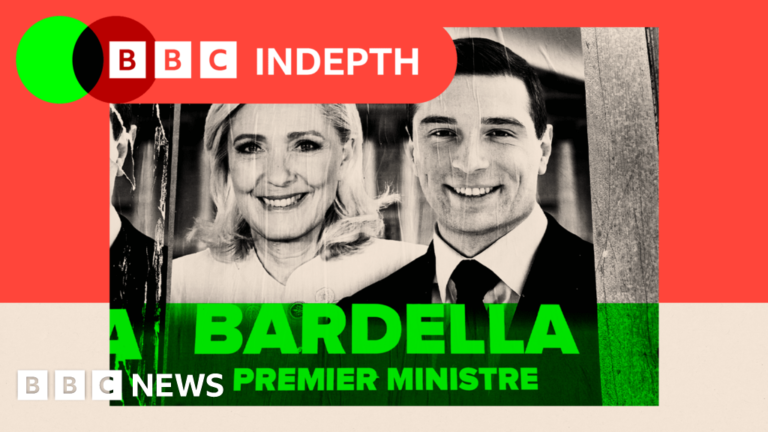Image source, Getty Images
The far right is on the brink of power in France. Will the rest of Europe follow suit?
- author, Katia Adler
- role, Europe Editor
How likely is it that France will witness a new far-right dawn on Monday morning?
This was the scenario that was splashed across media headlines and hotly debated in EU and government seats across Europe in Brussels after the first round of voting in the French parliament last week.
But despite the stunning victory of Marine Le Pen’s National Rally (RN) party, the bottom line is that it is possible for the RN to win a majority, but it is unlikely.
But whether the RN wins a majority or whether its young, social media-savvy leader, Jordan Bardella, becomes France’s new prime minister, the consequences of the election will be profound.
Opinion polls predict that the RN will almost certainly win more seats than any other political group.
That means breaking a decades-old taboo in France, a core EU country.
Image source, Getty Images
The EU was born from the ashes of World War II and was originally designed as a peace project with wartime enemies France and Germany at its core.
Far-right parties have been relegated to the fringes of European politics.
Last month, world leaders gathered in northern France to mark 80 years since D-Day, the Allied landings in Normandy that secured the defeat of Nazi Germany.
However, “far-right” or “extreme right” or “populist-nationalist” parties now form coalition governments in many EU countries, including the Netherlands, Italy and Finland.
It is difficult to label these parties because their policies change frequently and vary from country to country.
And normalization is not an entirely new phenomenon: Silvio Berlusconi, the center-right politician and former Italian prime minister, was the first EU leader to make this decision when he went to government in 1994 with the Italian Social Movement, a post-fascist political group.
Six years later, Austria’s conservative party formed a coalition government with the far-right Freedom Party, infuriating the EU at the time and blocking official bilateral talks with Austria for several months.
Due to postwar political conventions, the political mainstream Quarantine LineThe European Union introduced what it called “health barriers” around election time to prevent far-right forces from joining European governments.
The globally recognised term for the practice is French, which shows how passionate many people in France felt about it.
Image source, Getty Images
During the 2002 presidential election, some French voters would wear clothespins under their noses on the way to the polling station as a way to show they were voting for a candidate they didn’t like as much, in order to exclude the far-right.
The far-right party was led for many years by Marine Le Pen’s father and included former French members of the Nazi-led Waffen-SS.
Fast forward to 2024 and Marine Le Pen’s decade-long ambition to detoxify her father’s party – she worked hard to change its name and improve its image – appears to have been a huge success.
of Quarantine Line French politics has now been hit with a major blow after the leader of France’s centre-right party, La République, agreed not to contest certain constituencies with the French National Party this Sunday. This is a shock in French politics.
What is important for Marine Le Pen is that her supporters are no longer ashamed to admit it: the RN is no longer seen as a radical protest movement. Whatever its critics may claim, for many it offers a credible political program.
According to an Ipsos poll conducted for the Financial Times, French voters trust the RN more than any other party to manage the country’s economy and (currently weak) finances, despite the party’s lack of experience in running government and barely funded tax cuts and spending plans.
The anxiety and despair among European liberals over the growing success of the so-called “New Right” raises the question: Wouldn’t there have been less room for European populists if traditional legislators had served their voters better?
When I say populist, I am referring to politicians like Le Pen who claim to listen to the voices of “ordinary people,” speak on their behalf, and protect them from “the establishment.”
This “them and us” argument is highly effective when voters feel insecure and ignored by their governments – see Donald Trump in the US, the sudden and unexpected rise of Reform UK in Thursday’s UK election, and the runaway success of Germany’s controversial anti-immigration party AfD.
Many in France see Macron, a former commercial banker, as arrogant, entitled and out of touch with the day-to-day concerns of ordinary people outside the Paris bubble – someone they say has made difficult lives even harder by trying to raise the national pension age and fuel prices for environmental reasons.
It must be a source of frustration for the French president that his success in reducing unemployment and the billions of euros he spent to cushion the economic impact of the coronavirus and energy crisis appear to have been all but forgotten.
Meanwhile, the RN focused much of its campaign on the cost of living crisis.
Image source, Getty Images
The party has promised to cut taxes on gas and electricity and raise the minimum wage for low-income earners.
Those priorities mean the RN should not be labeled a far-right movement, its supporters argue: They point to its growing support base and say it should not be forever tainted by its racist roots under Le Pen.
Similar arguments are coming from Rome, where Italian Prime Minister Giorgia Meloni once praised the fascist dictator Benito Mussolini, and although her Italian Brothers party is a post-fascist force, she now heads one of the EU’s most stable governments.
She recently denounced a meeting of the party’s youth wing, where members were filmed making fascist salutes, and said there was no room for nostalgia for 20th-century totalitarian regimes in her party.
While domestic critics have warned about Meloni’s attempts to influence Italy’s media and attacks on LGBTQ+ rights, her specific proposals to tackle illegal immigration have been praised by mainstream Europeans, including European Commission President Ursula von der Leyen and recently ousted British Chancellor Rishi Sunak.
Frankly, when it comes to hot-button issues like immigration, it is becoming increasingly difficult to distinguish the political rhetoric of Europe’s far right from that of traditional mainstream politicians who are deliberately radicalizing their speech to retain voter support.
Other good examples include former Dutch Prime Minister Mark Rutte and Emmanuel Macron, who is feeling the heat from Marine Le Pen’s popularity.
One of the unintended consequences of mainstream politicians emulating parties to their right on immigration is that it makes the original anti-immigration parties seem more respectable, acceptable, and electable.
Take a look at the impressive performance that Geert Wilders, the anti-immigration politician who has often been accused of hate speech, recently put in during the Dutch general election.
The label “far-right” is up for debate, and varies greatly depending on the makeup of each political party.
But the kind of international acceptance that Meloni currently enjoys remains a distant dream for Le Pen.
The RN maintains it can still win a parliamentary majority this Sunday, although opinion polls suggest a paralyzed, hanging parliament or an unmanageable coalition government of parties other than Le Pen is more likely.
Either of these scenarios would reduce Emmanuel Macron to a fairly lame-duck president.
Domestic political instability means EU powerhouses France and Germany are looking inward at a time of great global uncertainty.
Wars are escalating in Gaza and Ukraine, and EU and NATO skeptic Donald Trump could be back in the White House.
Europe is in a precarious position without leadership. Voters are anxious.
Even if it’s not this Sunday, Marine Le Pen’s supporters are adamant that their moment will come. It’s coming soon.
BBC In-Depth is the new home of our website and app, bringing you the best analysis and expertise from our top journalists. Under our distinctive new brand, we’ll bring you fresh perspectives that question assumptions and in-depth reporting on the biggest issues to help you make sense of a complex world. We’ll also be showcasing thought-provoking content from BBC Sounds and iPlayer. We start small, but think big. We want to hear what you think. Click the button below to send us your feedback.
InDepth is a new site featuring the best analysis from across BBC news. Let us know what you think.


